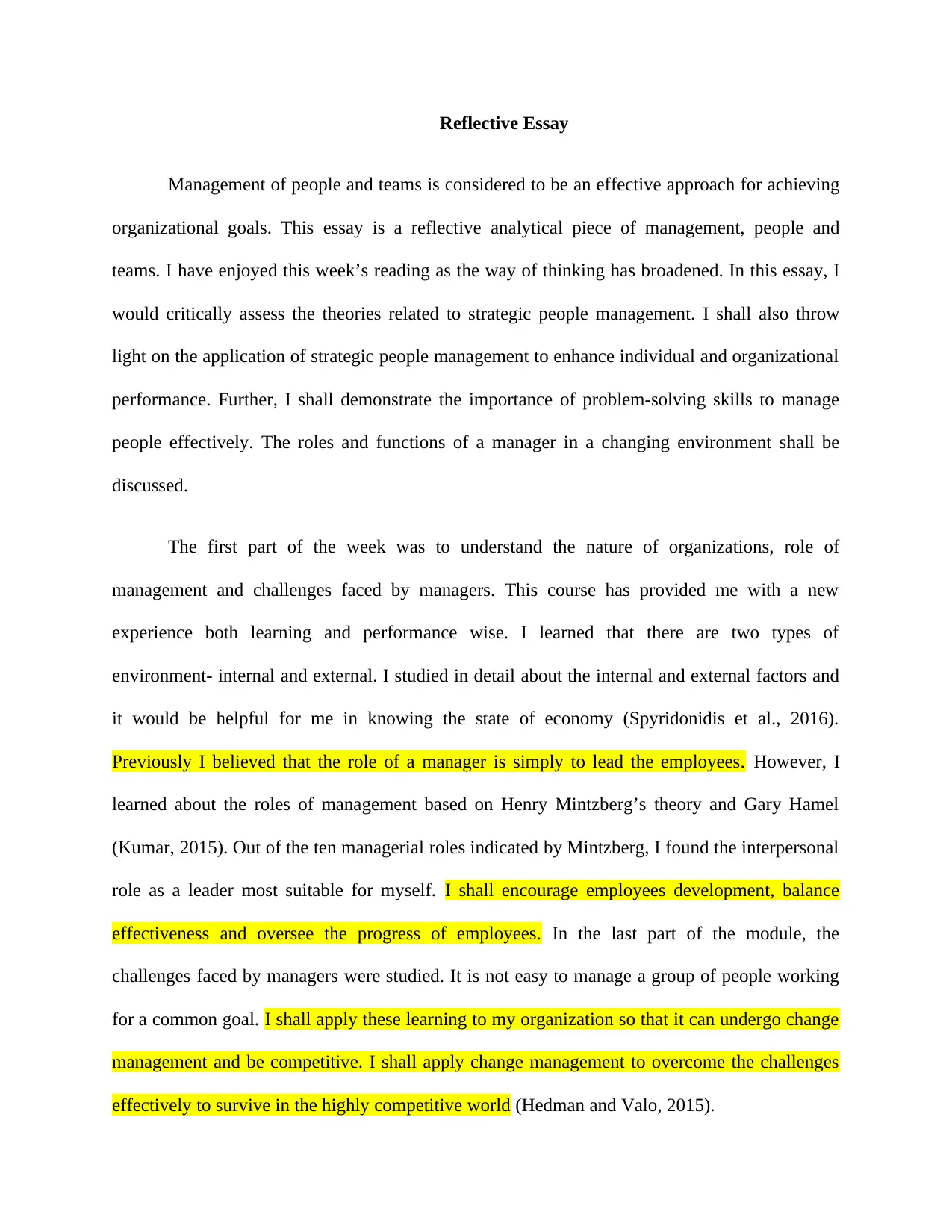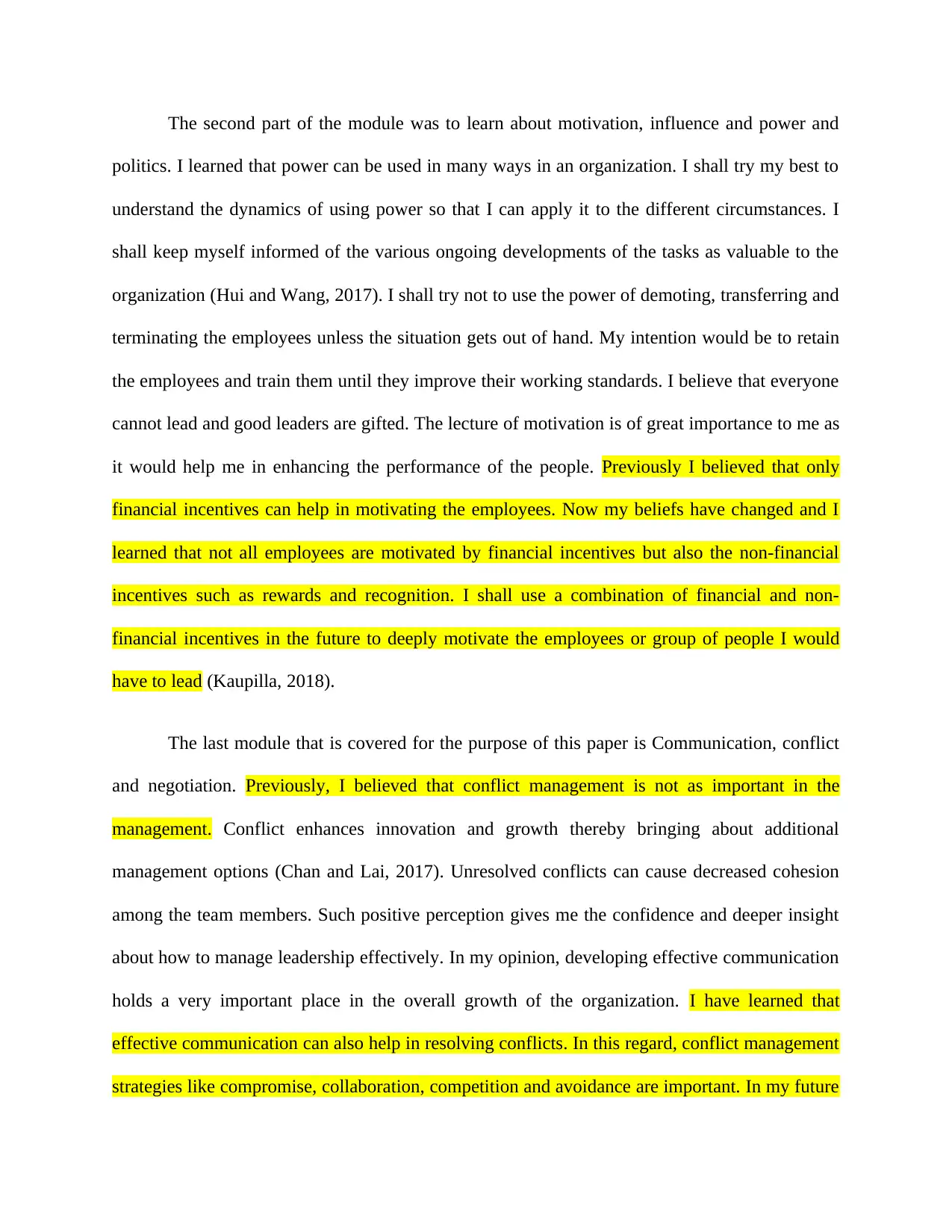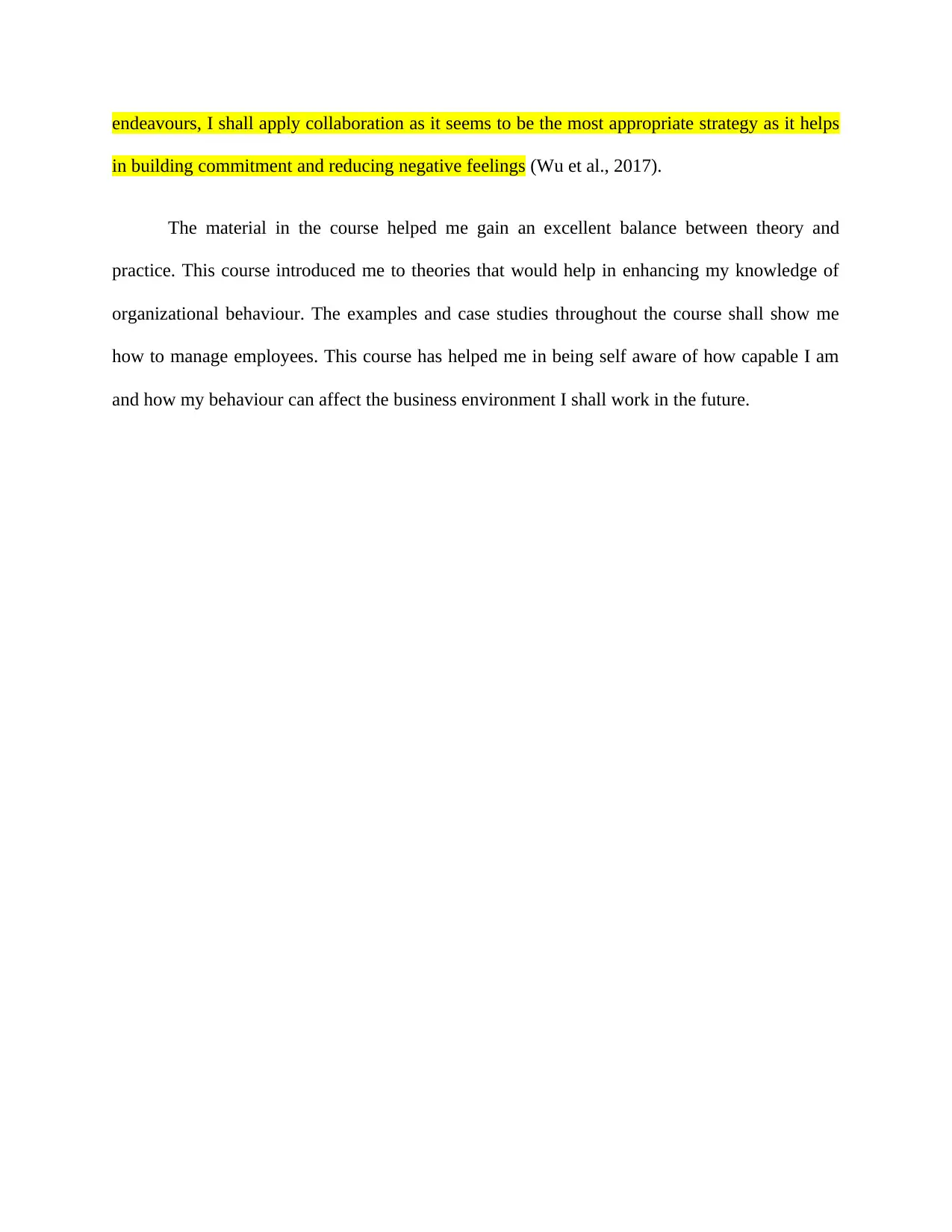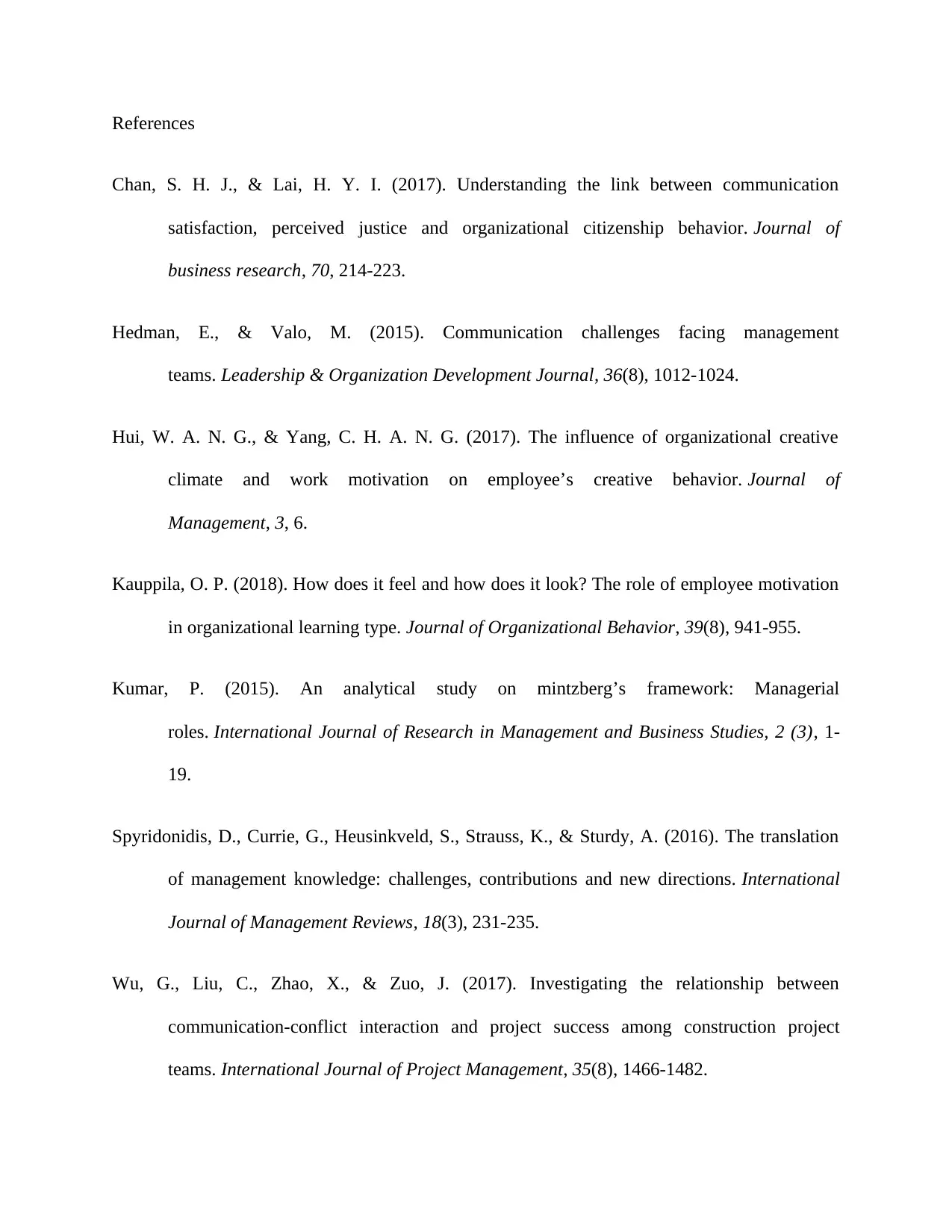MGT600 Reflective Essay: Management, People, and Teams Analysis
VerifiedAdded on 2023/04/10
|5
|934
|407
Essay
AI Summary
This reflective essay explores the principles and theories of strategic people management, analyzing their application in enhancing individual and organizational performance. It delves into the importance of problem-solving skills and effective communication in managing people within changing organizational environments. The essay reflects on the roles and functions of managers, drawing upon theories such as Mintzberg's managerial roles and examining the challenges they face. Key topics include motivation, influence, power dynamics, conflict management, and the integration of theory and practice in organizational behavior. The author reflects on personal learning experiences and how the course material has enhanced self-awareness and prepared them for future management roles. The essay concludes by highlighting the importance of continuous learning and adaptation in the field of management.

Reflective Essay
Management of people and teams is considered to be an effective approach for achieving
organizational goals. This essay is a reflective analytical piece of management, people and
teams. I have enjoyed this week’s reading as the way of thinking has broadened. In this essay, I
would critically assess the theories related to strategic people management. I shall also throw
light on the application of strategic people management to enhance individual and organizational
performance. Further, I shall demonstrate the importance of problem-solving skills to manage
people effectively. The roles and functions of a manager in a changing environment shall be
discussed.
The first part of the week was to understand the nature of organizations, role of
management and challenges faced by managers. This course has provided me with a new
experience both learning and performance wise. I learned that there are two types of
environment- internal and external. I studied in detail about the internal and external factors and
it would be helpful for me in knowing the state of economy (Spyridonidis et al., 2016).
Previously I believed that the role of a manager is simply to lead the employees. However, I
learned about the roles of management based on Henry Mintzberg’s theory and Gary Hamel
(Kumar, 2015). Out of the ten managerial roles indicated by Mintzberg, I found the interpersonal
role as a leader most suitable for myself. I shall encourage employees development, balance
effectiveness and oversee the progress of employees. In the last part of the module, the
challenges faced by managers were studied. It is not easy to manage a group of people working
for a common goal. I shall apply these learning to my organization so that it can undergo change
management and be competitive. I shall apply change management to overcome the challenges
effectively to survive in the highly competitive world (Hedman and Valo, 2015).
Management of people and teams is considered to be an effective approach for achieving
organizational goals. This essay is a reflective analytical piece of management, people and
teams. I have enjoyed this week’s reading as the way of thinking has broadened. In this essay, I
would critically assess the theories related to strategic people management. I shall also throw
light on the application of strategic people management to enhance individual and organizational
performance. Further, I shall demonstrate the importance of problem-solving skills to manage
people effectively. The roles and functions of a manager in a changing environment shall be
discussed.
The first part of the week was to understand the nature of organizations, role of
management and challenges faced by managers. This course has provided me with a new
experience both learning and performance wise. I learned that there are two types of
environment- internal and external. I studied in detail about the internal and external factors and
it would be helpful for me in knowing the state of economy (Spyridonidis et al., 2016).
Previously I believed that the role of a manager is simply to lead the employees. However, I
learned about the roles of management based on Henry Mintzberg’s theory and Gary Hamel
(Kumar, 2015). Out of the ten managerial roles indicated by Mintzberg, I found the interpersonal
role as a leader most suitable for myself. I shall encourage employees development, balance
effectiveness and oversee the progress of employees. In the last part of the module, the
challenges faced by managers were studied. It is not easy to manage a group of people working
for a common goal. I shall apply these learning to my organization so that it can undergo change
management and be competitive. I shall apply change management to overcome the challenges
effectively to survive in the highly competitive world (Hedman and Valo, 2015).
Paraphrase This Document
Need a fresh take? Get an instant paraphrase of this document with our AI Paraphraser

The second part of the module was to learn about motivation, influence and power and
politics. I learned that power can be used in many ways in an organization. I shall try my best to
understand the dynamics of using power so that I can apply it to the different circumstances. I
shall keep myself informed of the various ongoing developments of the tasks as valuable to the
organization (Hui and Wang, 2017). I shall try not to use the power of demoting, transferring and
terminating the employees unless the situation gets out of hand. My intention would be to retain
the employees and train them until they improve their working standards. I believe that everyone
cannot lead and good leaders are gifted. The lecture of motivation is of great importance to me as
it would help me in enhancing the performance of the people. Previously I believed that only
financial incentives can help in motivating the employees. Now my beliefs have changed and I
learned that not all employees are motivated by financial incentives but also the non-financial
incentives such as rewards and recognition. I shall use a combination of financial and non-
financial incentives in the future to deeply motivate the employees or group of people I would
have to lead (Kaupilla, 2018).
The last module that is covered for the purpose of this paper is Communication, conflict
and negotiation. Previously, I believed that conflict management is not as important in the
management. Conflict enhances innovation and growth thereby bringing about additional
management options (Chan and Lai, 2017). Unresolved conflicts can cause decreased cohesion
among the team members. Such positive perception gives me the confidence and deeper insight
about how to manage leadership effectively. In my opinion, developing effective communication
holds a very important place in the overall growth of the organization. I have learned that
effective communication can also help in resolving conflicts. In this regard, conflict management
strategies like compromise, collaboration, competition and avoidance are important. In my future
politics. I learned that power can be used in many ways in an organization. I shall try my best to
understand the dynamics of using power so that I can apply it to the different circumstances. I
shall keep myself informed of the various ongoing developments of the tasks as valuable to the
organization (Hui and Wang, 2017). I shall try not to use the power of demoting, transferring and
terminating the employees unless the situation gets out of hand. My intention would be to retain
the employees and train them until they improve their working standards. I believe that everyone
cannot lead and good leaders are gifted. The lecture of motivation is of great importance to me as
it would help me in enhancing the performance of the people. Previously I believed that only
financial incentives can help in motivating the employees. Now my beliefs have changed and I
learned that not all employees are motivated by financial incentives but also the non-financial
incentives such as rewards and recognition. I shall use a combination of financial and non-
financial incentives in the future to deeply motivate the employees or group of people I would
have to lead (Kaupilla, 2018).
The last module that is covered for the purpose of this paper is Communication, conflict
and negotiation. Previously, I believed that conflict management is not as important in the
management. Conflict enhances innovation and growth thereby bringing about additional
management options (Chan and Lai, 2017). Unresolved conflicts can cause decreased cohesion
among the team members. Such positive perception gives me the confidence and deeper insight
about how to manage leadership effectively. In my opinion, developing effective communication
holds a very important place in the overall growth of the organization. I have learned that
effective communication can also help in resolving conflicts. In this regard, conflict management
strategies like compromise, collaboration, competition and avoidance are important. In my future

endeavours, I shall apply collaboration as it seems to be the most appropriate strategy as it helps
in building commitment and reducing negative feelings (Wu et al., 2017).
The material in the course helped me gain an excellent balance between theory and
practice. This course introduced me to theories that would help in enhancing my knowledge of
organizational behaviour. The examples and case studies throughout the course shall show me
how to manage employees. This course has helped me in being self aware of how capable I am
and how my behaviour can affect the business environment I shall work in the future.
in building commitment and reducing negative feelings (Wu et al., 2017).
The material in the course helped me gain an excellent balance between theory and
practice. This course introduced me to theories that would help in enhancing my knowledge of
organizational behaviour. The examples and case studies throughout the course shall show me
how to manage employees. This course has helped me in being self aware of how capable I am
and how my behaviour can affect the business environment I shall work in the future.
⊘ This is a preview!⊘
Do you want full access?
Subscribe today to unlock all pages.

Trusted by 1+ million students worldwide

References
Chan, S. H. J., & Lai, H. Y. I. (2017). Understanding the link between communication
satisfaction, perceived justice and organizational citizenship behavior. Journal of
business research, 70, 214-223.
Hedman, E., & Valo, M. (2015). Communication challenges facing management
teams. Leadership & Organization Development Journal, 36(8), 1012-1024.
Hui, W. A. N. G., & Yang, C. H. A. N. G. (2017). The influence of organizational creative
climate and work motivation on employee’s creative behavior. Journal of
Management, 3, 6.
Kauppila, O. P. (2018). How does it feel and how does it look? The role of employee motivation
in organizational learning type. Journal of Organizational Behavior, 39(8), 941-955.
Kumar, P. (2015). An analytical study on mintzberg’s framework: Managerial
roles. International Journal of Research in Management and Business Studies, 2 (3), 1-
19.
Spyridonidis, D., Currie, G., Heusinkveld, S., Strauss, K., & Sturdy, A. (2016). The translation
of management knowledge: challenges, contributions and new directions. International
Journal of Management Reviews, 18(3), 231-235.
Wu, G., Liu, C., Zhao, X., & Zuo, J. (2017). Investigating the relationship between
communication-conflict interaction and project success among construction project
teams. International Journal of Project Management, 35(8), 1466-1482.
Chan, S. H. J., & Lai, H. Y. I. (2017). Understanding the link between communication
satisfaction, perceived justice and organizational citizenship behavior. Journal of
business research, 70, 214-223.
Hedman, E., & Valo, M. (2015). Communication challenges facing management
teams. Leadership & Organization Development Journal, 36(8), 1012-1024.
Hui, W. A. N. G., & Yang, C. H. A. N. G. (2017). The influence of organizational creative
climate and work motivation on employee’s creative behavior. Journal of
Management, 3, 6.
Kauppila, O. P. (2018). How does it feel and how does it look? The role of employee motivation
in organizational learning type. Journal of Organizational Behavior, 39(8), 941-955.
Kumar, P. (2015). An analytical study on mintzberg’s framework: Managerial
roles. International Journal of Research in Management and Business Studies, 2 (3), 1-
19.
Spyridonidis, D., Currie, G., Heusinkveld, S., Strauss, K., & Sturdy, A. (2016). The translation
of management knowledge: challenges, contributions and new directions. International
Journal of Management Reviews, 18(3), 231-235.
Wu, G., Liu, C., Zhao, X., & Zuo, J. (2017). Investigating the relationship between
communication-conflict interaction and project success among construction project
teams. International Journal of Project Management, 35(8), 1466-1482.
Paraphrase This Document
Need a fresh take? Get an instant paraphrase of this document with our AI Paraphraser

1 out of 5
Related Documents
Your All-in-One AI-Powered Toolkit for Academic Success.
+13062052269
info@desklib.com
Available 24*7 on WhatsApp / Email
![[object Object]](/_next/static/media/star-bottom.7253800d.svg)
Unlock your academic potential
Copyright © 2020–2026 A2Z Services. All Rights Reserved. Developed and managed by ZUCOL.



